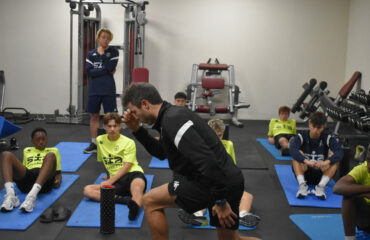Talking about football means talking about passion, effort, and talent — but also about something deeper and less visible: ethics. Without it, the sport loses its humanity; with it, it becomes a true school of life. At SIA Academy, we are convinced that the real formation of a player doesn’t end on the training field but continues in the way they live, decide, and relate to others.
Table of contents
Ethics as a formative pillar
Since our beginnings at SIA Academy, we have understood that ethics is not just another subject — it is the foundation that supports the entire educational and sporting process. We work with young people who dream of reaching professional football, but we teach them that being professional begins with attitude, not with a contract.
Every session, every friendly match, and every group experience becomes an opportunity to strengthen values such as respect, responsibility, and honesty. As José Luis, psychologist at the academy, says, “ethics is the mirror in which a player sees themselves when no one else is watching.” That self-reflection is what separates those who simply want to shine from those who truly want to make a difference.

Beyond talent: values in competition
In elite football, talent is only part of the journey. Sports ethics is what sustains a career over time. It’s not enough to train well — one must behave well, both on and off the pitch. An ethical player respects the rules, accepts mistakes, and refuses to justify unsportsmanlike behavior in the name of competitiveness.
In our training programs, coaches and psychologists work together to identify behaviors that reflect solid ethics. If a footballer apologizes after a tough tackle, raises a hand to admit a foul, or helps an injured opponent, they are showing more than sportsmanship — they are showing character.
At SIA Academy, we believe that ethics can be trained, just like technique or tactics. It’s not about imposing rules; it’s about creating awareness. The player must understand that their conduct is part of the message they send to the world.
Leadership inside the locker room
In a team, not everyone wears the captain’s armband, but everyone can be an ethical leader. The ethics of leadership means leading by example, staying calm when the match gets tough, and defending unity above ego. An ethical leader doesn’t humiliate, doesn’t shout without reason, and doesn’t disappear when things go wrong.
In our internal sessions, we remind players that football doesn’t just reveal skill — it reveals character. José Luis explains it clearly: “A player with ethics influences more through what they do than what they say. Their behavior spreads, inspires, and teaches without the need for speeches.”
This principle is key in our academy: leadership is not measured by the loudest voice, but by the consistency between word and action. In a locker room grounded in ethics, trust becomes the foundation of collective performance.
Social media: the new playing field
Today, a footballer’s image extends far beyond the pitch. Social media amplifies every gesture, every statement, every mistake. That’s why digital ethics has become an essential part of modern training. At SIA Academy, we guide our players to understand that how they behave online also speaks about who they are.
Posting respectfully, avoiding offensive comments, and recognizing their influence over followers are now part of their holistic education. A player with digital ethics understands that admiration is not earned only through goals, but also through consistency and responsibility.
Resilience: when defeat teaches
Football, like life, is full of difficult moments. Injuries, losses, or unfair calls can test a player’s emotional stability. In those moments, ethics acts as a moral compass. We teach our footballers to face defeat with humility, to avoid excuses, and to value effort over outcome.
The ethic of effort reminds us that improving every day is more important than winning today. At SIA Academy, we celebrate not only goals but also gestures of resilience. Because a player who stands up with dignity after losing has understood the true spirit of the sport.

Ethics as football’s legacy
Football has enormous power to influence society. When a player acts with ethics, they inspire thousands of young people watching them. That’s why at SIA Academy, we proudly embrace our responsibility: to form footballers who are also ethical role models. We want our players to understand that their behavior can change perceptions, build community, and dignify the game.
Every hug after a match, every word of encouragement to a teammate who failed, every handshake with an opponent — these are lessons of silent ethics, the ones that don’t appear in statistics but remain in memory.
Football without ethics becomes empty. But when ethics is present, the game turns into an educational tool, a channel for empathy, and an opportunity to build a fairer world. At SIA Academy, we are certain of one thing: technique opens the path, but only ethics keeps it straight and honorable.
The value of playing with conscience
In an age ruled by immediacy, speaking about ethics may sound idealistic. Yet that’s precisely why it’s more necessary than ever. In football, true greatness is not measured by the number of trophies, but by the human quality of those who win them.
At SIA Academy, we form players who don’t just chase the ball — they chase purpose. Because we understand that football without ethics doesn’t educate, and we don’t just train athletes: we shape people with values, capable of changing the game — and life itself.






